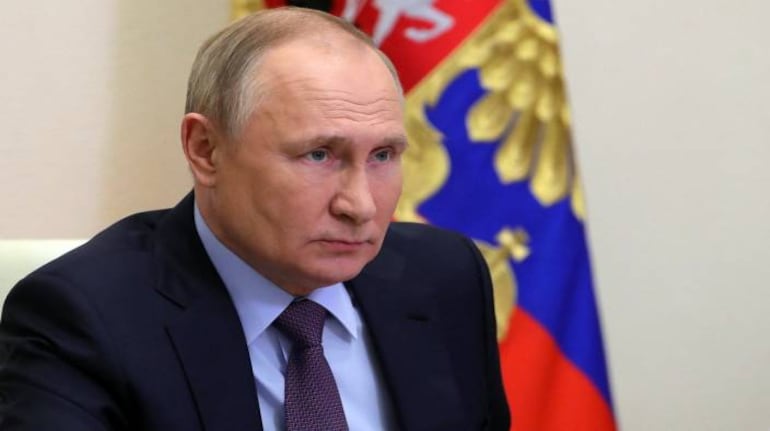



Twenty years after it launched a devastating war on Iraq resulting in the death of thousands of innocent people, a large section of the US population appears to have realised that it had made a huge mistake in invading the West Asian country. Ironically, the shift in America’s mood on Iraq coincided with the International Criminal Court (ICC) issuing an arrest warrant against Russian President Vladimir Putin for a similar invasion of Ukraine.
In a statement last week, the ICC said it had reasonable grounds to believe Putin committed the criminal acts directly, as well as working with others. It also accused him of failing to use his presidential powers to stop children being deported.
Moscow has denied the allegations and denounced the warrants as "outrageous".
US President Joseph Biden’s administration has cheered the ICC decision and welcomed it. But interestingly, the US does not encourage the court in The Hague to investigate alleged war crimes committed by the US during its long military campaigns in Iraq and Afghanistan.
This was reinforced by Biden describing the ICC warrant against Putin as “justified” and hailing the court for making a very strong point, even as he was quick to add that the US does not recognise the ICC’s jurisdiction.
Though the US was among the countries instrumental in setting up the ICC, it is not a member of the ICC, nor is Russia. In the past, US presidents have prevented the ICC from investigating the American administrations or its military and its allies like Israel for crimes that they might have committed during a war. But this has not stopped the US from supporting the arrest warrant against Putin.
The US’ blatant hypocrisy over the issue has put many activists who were keen to punish the Russian president for his invasion of and war crimes in Ukraine in a spot. They now feel that if the international community must act against Putin, it cannot overlook the role of the US in previous wars in Iraq, Afghanistan and elsewhere.
“The US applauds the ICC when it charges Russia with war crimes and excoriates the same body when it starts looking into whether America committed war crimes in Afghanistan and Israel against besieged Palestinians,” a columnist said in an article on the Al Jazeera website.
Over the weekend, a number of polls conducted in the US marking the 20th anniversary of the US’ decision to invade Iraq found markedly diminished support. According to the Beijing-based CGTN, a poll of global internet users it conducted showed that 93.15 percent of respondents believe that the US should be held accountable for war crimes committed in Iraq.
The American non-partisan think tank Pew Research Centre, while analysing the huge levels of public support in the past for the military campaign in Iraq, said the George W. Bush administration’s success in these efforts was the result of several factors, not the least of which was the climate of public opinion at the time.
It added, “Still reeling from the horrors of the September 11, 2001, terrorist attacks, Americans were extraordinarily accepting of the possible use of military force as part of what Bush called the ‘global war on terror’.”
Throughout 2002 and early 2003, President Bush and his administration marshalled wide backing for the use of military force in Iraq among both the public and Congress. When the US launched its military campaign on March 19, 2003, over 66 percent of people polled supported the armed action against Iraq. But recent polls show that more than 62 percent of Americans, including a sizeable number of war veterans, think the invasion was a big mistake.
Obviously, it was not limited to military personnel. Speaking to a Turkish web portal, Zaid al-Mahdawi, an Iraqi living in Houston and who was in Baghdad when the war began, said, “It was a huge mistake that can’t just be stricken from the record.” He said, “The US lost credibility and made things worse.” He added, “The world will never forget the atrocities of the war.”
According to him, the Iraqi people suffered a decade of internal displacement caused by the multiple and overlapping conflicts triggered by the invasion and the insurgency, which culminated in the emergence of the Islamic State of Iraq and the Levant or ISIS, the sect that wanted to create an Islamist caliphate in the region, and its capture of large areas of Iraq between 2014 and 2017.
“The invasion of Iraq caused immense damage to the American and British image in the Middle East,” said. Kristian Coates Ulrichsen, professor and fellow for Middle East studies at Rice University’s Baker Institute.
Coming back to the ICC warrant, observers said it is highly unlikely that much will come of it as the court has no powers to arrest suspects without the cooperation of the government of the country concerned. However, it could affect Putin’s travel to many nations as he could be arrested if he sets foot in any of the 123 countries that are members of the ICC.
Analysts added that under the circumstances, the ICC warrant against the Russian president could only be a propaganda point among the western countries to highlight alleged atrocities committed by Russian soldiers in Ukraine. But as the war has already polarised countries around the world, it is unlikely that the warrant against Putin will put additional international pressure on the Russian president.
Moreover, in the face of the public opinion in the US and other western countries on the Iraq war and Washington’s approach to the ICC, very few may like to join an American initiative to isolate the Kremlin strongman.
Discover the latest Business News, Sensex, and Nifty updates. Obtain Personal Finance insights, tax queries, and expert opinions on Moneycontrol or download the Moneycontrol App to stay updated!
Find the best of Al News in one place, specially curated for you every weekend.
Stay on top of the latest tech trends and biggest startup news.